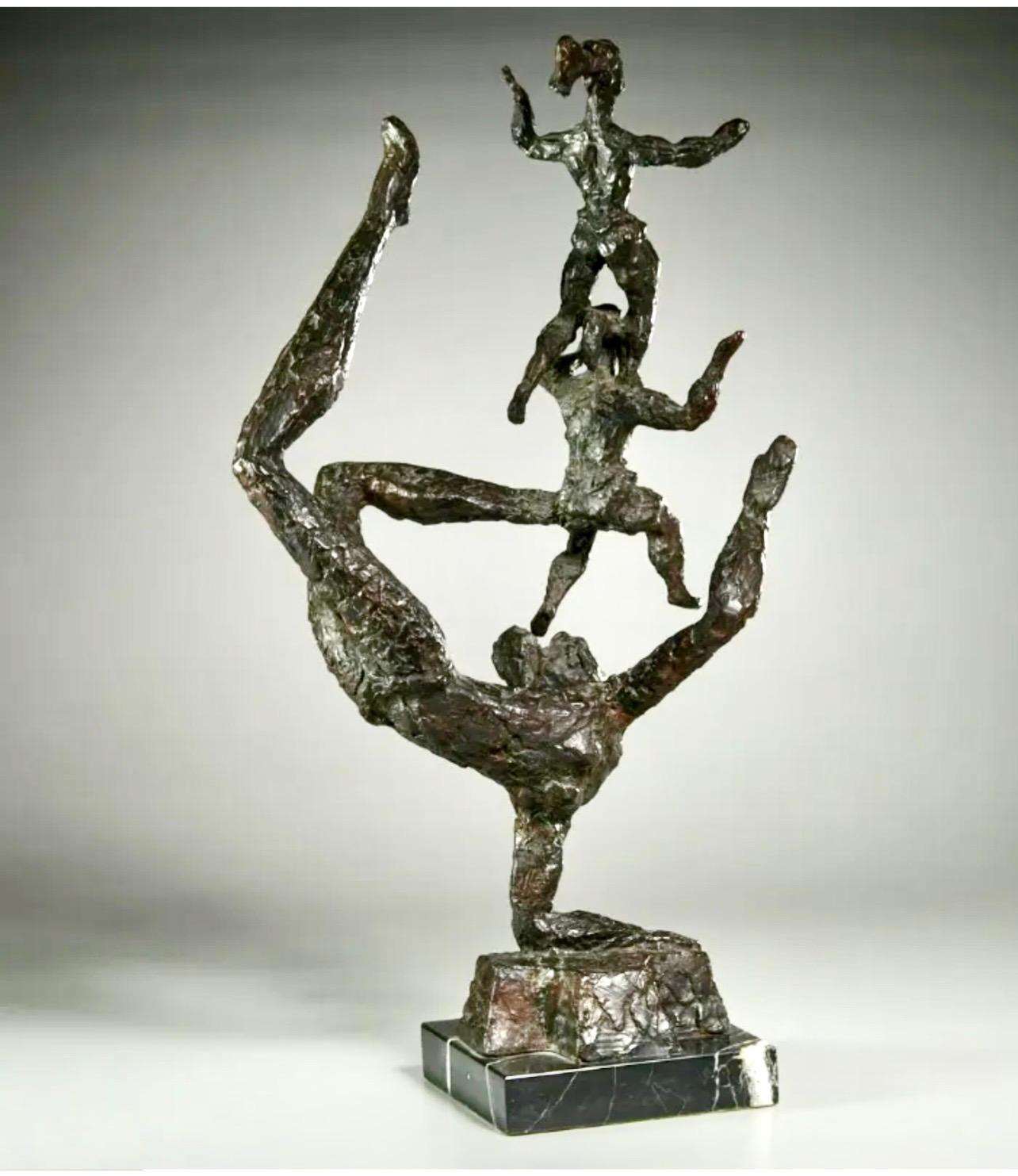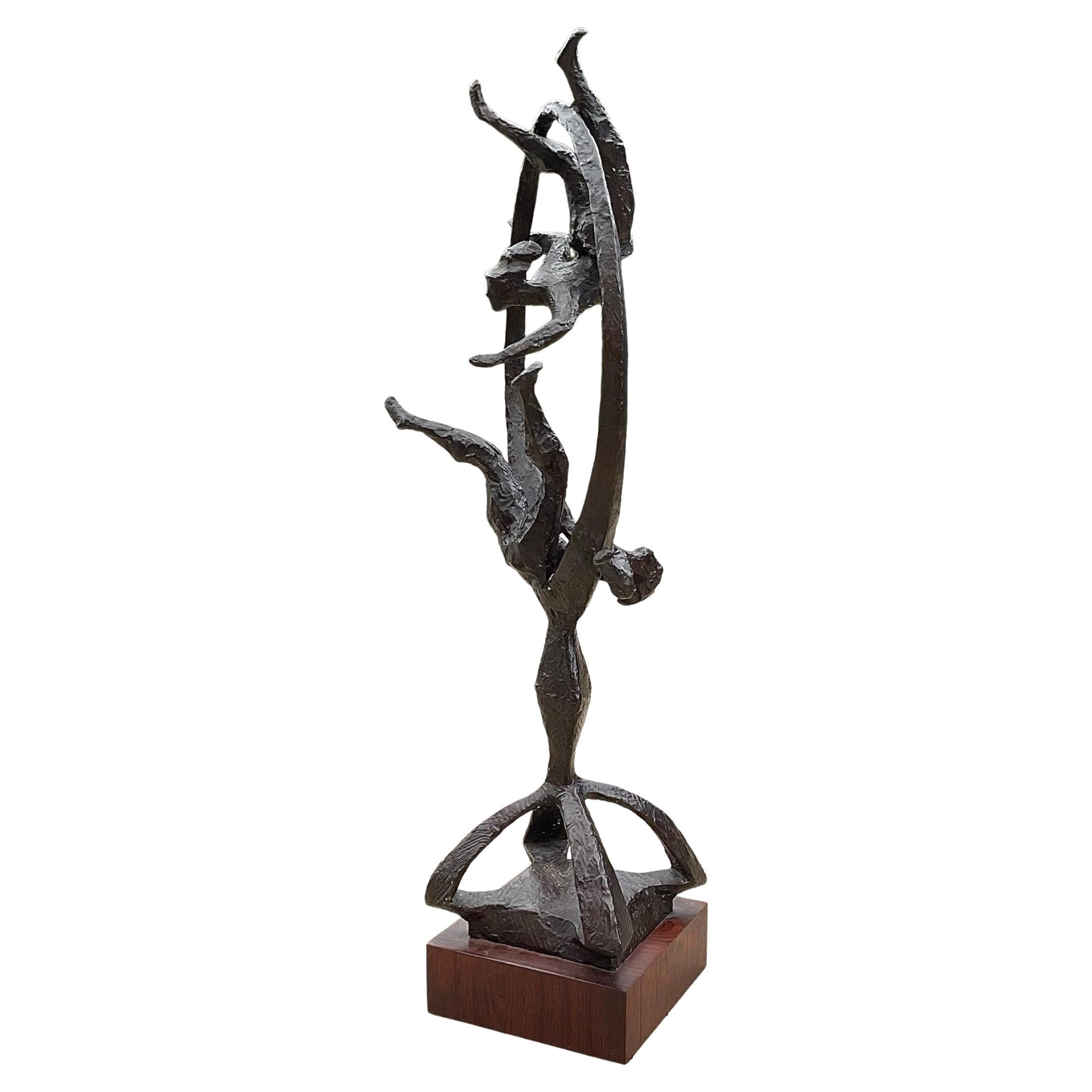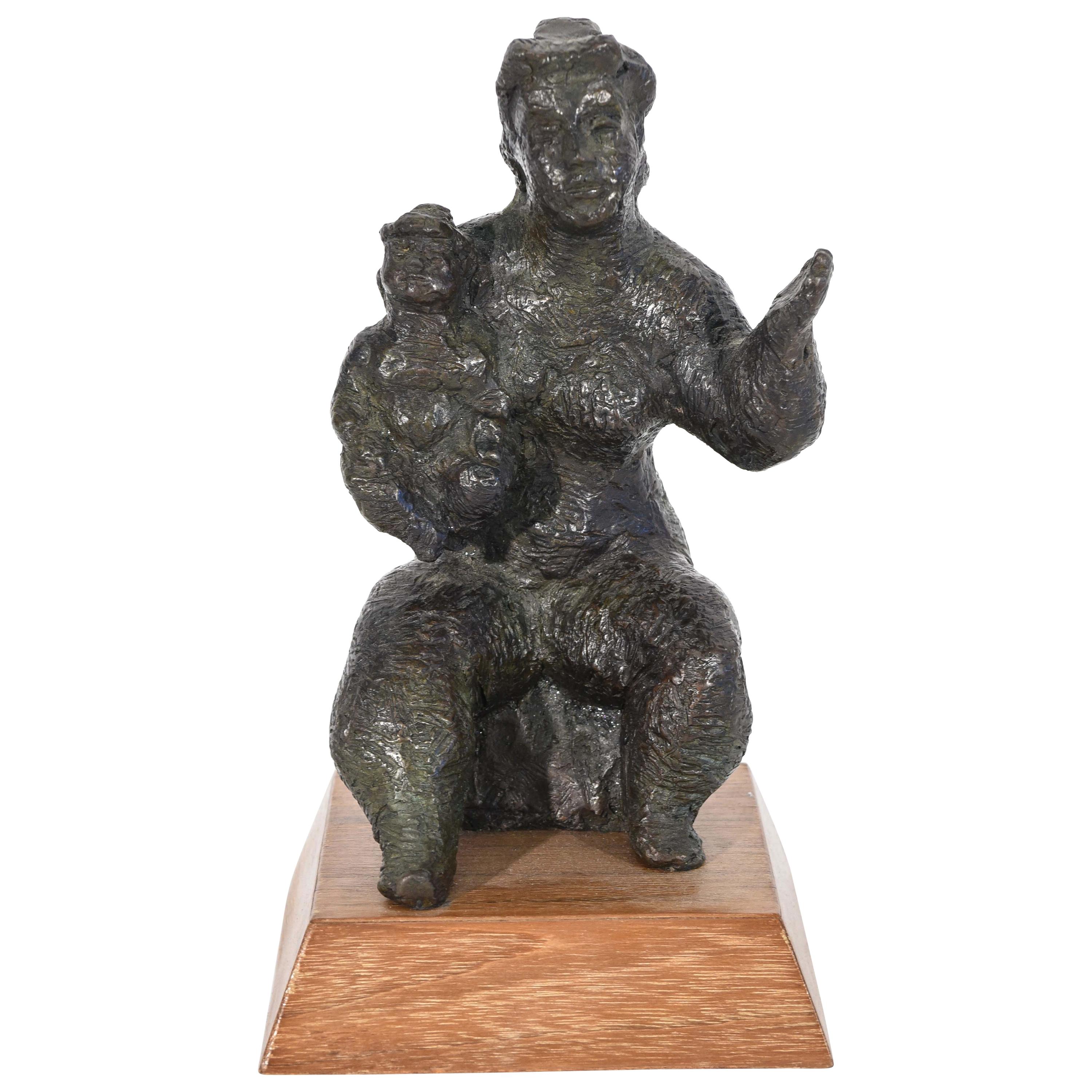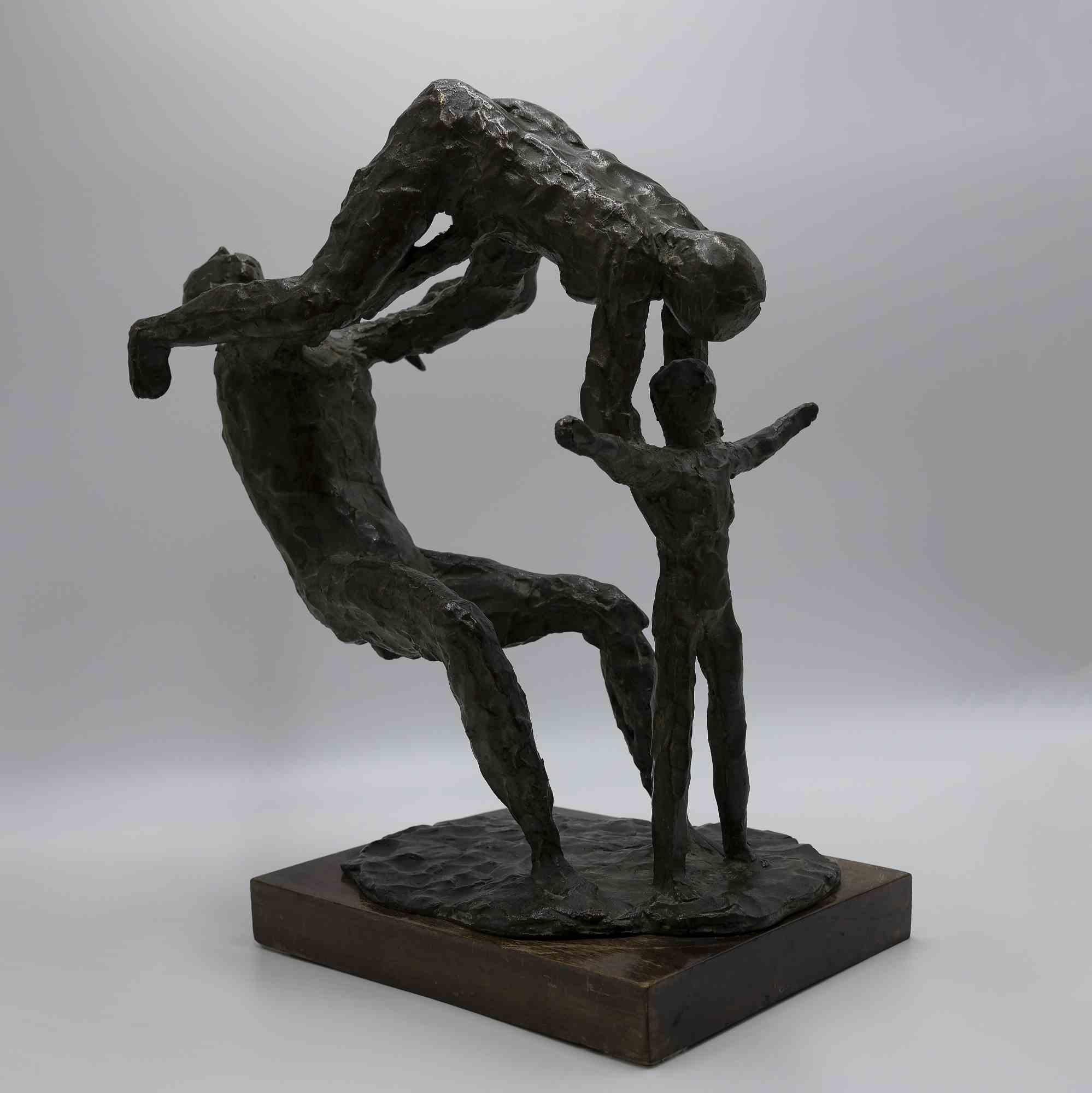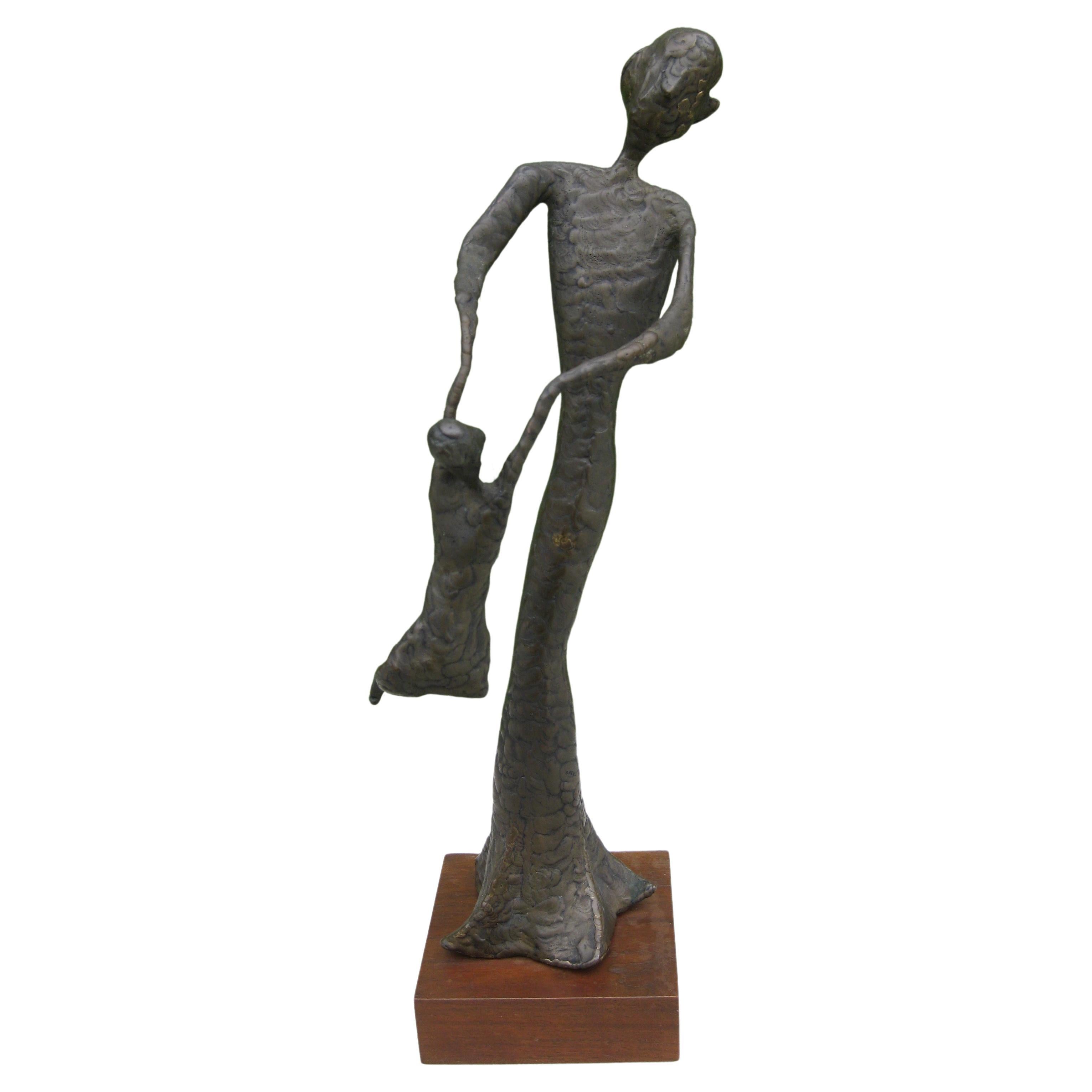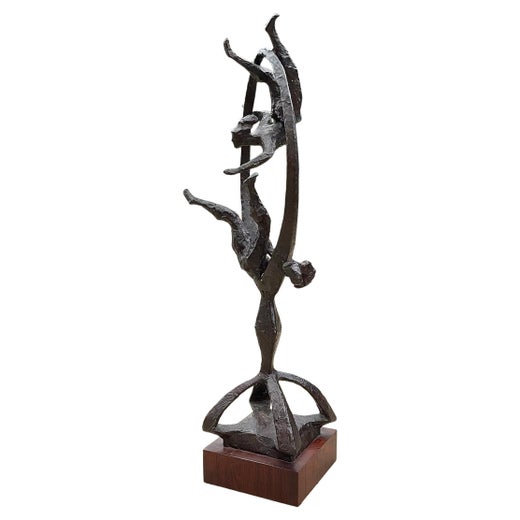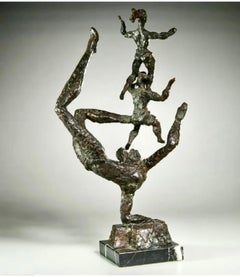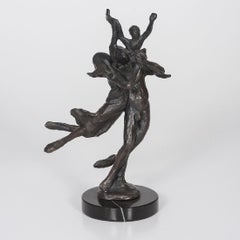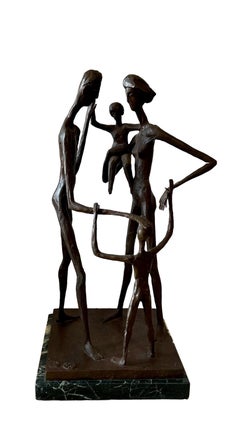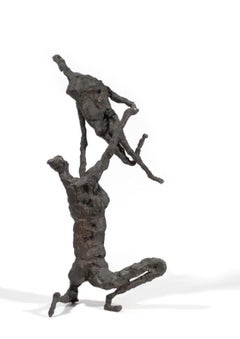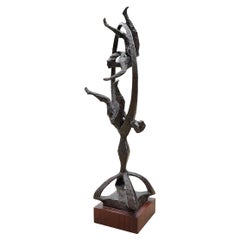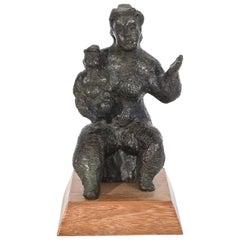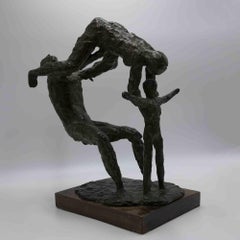Chaim Gross (American, 1904-1991)
Patinated cast bronze sculpture,
Balancing, Mother and child
signed and editioned 1/6
mounted on black marble plinth
14"h x 11.5"w x 8"d (height without base is about 13")
Provenance: bears a label from Forum Gallery underneath
Chaim Gross (March 17, 1904 – May 5, 1991) was an American modernist sculptor and educator.
Gross was born to a Jewish family in Austrian Galicia, in the village of Wolowa (now known as Mezhgorye, Ukraine), in the Carpathian Mountains. In 1911, his family moved to Kolomyia (which was annexed into the Ukrainian USSR in 1939 and became part of newly independent Ukraine in 1991). When World War I ended, Gross and brother Avrom-Leib went to Budapest to join their older siblings Sarah and Pinkas. Gross applied to and was accepted by the art academy in Budapest and studied under the painter Béla Uitz, though within a year a new regime under Miklos Horthy took over and attempted to expel all Jews and foreigners from the country. After being deported from Hungary, Gross began art studies at the Kunstgewerbeschule in Vienna, Austria shortly before immigrating to the United States in 1921. Gross's studies continued in the United States at the Beaux-Arts Institute of Design, where he studied with Elie Nadelman and others, and at the Art Students League of New York, with Robert Laurent. He also attended the Educational Alliance Art School, studying under Abbo Ostrowsky, at the same time as Moses Soyer and Peter Blume.
In 1926 Gross began teaching at The Educational Alliance, and continued teaching there for the next 50 years. Louise Nevelson was among his students at the Alliance (in 1934), during the time she was transitioning from painting to sculpture. In the late 1920s and early 1930s he exhibited at the Salons of America exhibitions at the Anderson Galleries and, beginning in 1928, at the Whitney Studio Club. In 1929, Gross experimented with printmaking, and created an important group of 15 linocuts and lithographs of landscapes, New York City streets and parks, women in interiors, the circus, and vaudeville. The entire suite is now in the collection of the Philadelphia Museum of Art. Gross returned to the medium of printmaking in the 1960s, and produced approximately 200 works in the medium over the next two decades. For more than sixty years Chaim Gross's art has expressed optimistic, affirming themes, Judaica, balancing acrobats, cyclists, trapeze artists and mothers and children convey joyfulness, modernism, exuberance, love, and intimacy. This aspect of his work remained consistent with his Jewish Hasidic heritage, which teaches that only in his childlike happiness is man nearest to God.
In March 1932 Gross had his first solo exhibition at Gallery 144 in New York City. For a short time they represented Gross, as well as his friends Milton Avery, Moses Soyer, Ahron Ben-Shmuel and others.
Gross was primarily a practitioner of the direct carving method, with the majority of his work being carved from wood. Other direct carvers in early 20th-century American art include William Zorach, Jose de Creeft, and Robert Laurent. Works by Chaim Gross can be found in major museums and private collections throughout the United States, with substantial holdings (27 sculptures) at the Hirshhorn Museum and Sculpture Garden. A key work from this era, now at the Smithsonian American Art Museum, is the 1932 birds-eye maple Acrobatic Performers, which is also only one and one quarter inch thick.
In 1933 Gross joined the government's PWAP (Public Works of Art Project), which transitioned into the WPA (Works Progress Administration), which Gross worked for later in the 1930s. Under these programs Gross taught and demonstrated art, made sculptures that were placed in schools and public colleges, made work for Federal buildings including the Federal Trade Commission Building, and for the France Overseas and Finnish Buildings at the 1939 New York World's Fair. Gross was also recognized during these years with a silver medal at the Exposition universelle de 1937 in Paris, and in 1942, with a purchase prize at the Metropolitan Museum of Art's "Artists for Victory" exhibition for his wood sculpture of famed circus performer Lillian Leitzel.
In 1949 Gross sketched Chaim Weizmann, President of Israel, at several functions in New York City where Weizmann was speaking, Gross completed the bust in bronze later that year. Gross returned to Israel for three months in 1951 (the second of many trips there in the postwar years) to paint a series of 40 watercolors of life in various cities. This series was exhibited at the Jewish Museum (Manhattan) in 1953.
In the 1950s Gross began to make more bronze sculptures alongside his wood and stone pieces, and in 1957 and 1959 he traveled to Rome to work with famed bronze foundries including the Nicci foundry. At the end of the decade Gross was working primarily in bronze which allowed him to create open forms, large-scale works and of course, multiple casts. Gross's large-scale bronze The Family, donated to New York City in 1991 in honor of Mayor Ed Koch, and installed at the Bleecker Street Park at 11th street, is now a fixture of Greenwich Village. In 1959, a survey of Gross's sculpture in wood, stone, and bronze was featured in the exhibit Four American Expressionists curated by Lloyd Goodrich at the Whitney Museum of American Art, with work by Abraham Rattner, Doris Caesar, and Karl Knaths. In 1976, a selection from Gross's important collection of historic African sculpture, formed since the late 1930s, was exhibited at the Worcester Art Museum in the show The Sculptor's Eye: The African Art Collection of Mr. and Mrs. Chaim Gross. Gross was elected into the National Academy of Design as an Associate member, and became a full Academician in 1981. In 1984, he was inducted into the American Academy of Arts and Letters, with Jacob Lawrence and Lukas Foss. In the fall of 1991, Allen Ginsberg gave an important tribute to Gross at the American Academy of Arts and Letters, which is published in their Proceedings. In 1994, Forum Gallery, which now represents the Chaim Gross estate, held a memorial exhibition featuring a sixty-year survey of Gross's work.
Gross was a professor of printmaking and sculpture at both the Educational Alliance and the New School for Social Research in New York City, as well as at the Brooklyn Museum Art School, the MoMA art school, the Art Student's League and the New Art School (which Gross ran briefly with Alexander Dobkin, Raphael Soyer and Moses Soyer). Gross was a member of the New York Artists Equity Association and the Federation of Modern Painters and Sculptors. He was a founder and served as the first president of the Sculptors Guild. Along with Ben Shahn, William Gropper, Ben Zion and Abraham Rattner he was an influential mid century Jewish American artist. In 1932 Gross married Renee Nechin (d. 2005), and they had two children, Yehuda and Mimi. Mimi Gross is a New York-based artist. She was married to the artist Red Grooms from 1963-1976.
1959 Four American Expressionists: Doris Caesar, Chaim Gross, Karl Knaths, Abraham Rattner. He is in the collections of the Museum of Modern Art; the Metropolitan Museum of Art; the Whitney Museum of American Art; the Philadelphia Museum of Art; the Art Institute of Chicago; the Tel Aviv Museum of Art, Israel. His work was included in the Whitney 1945 Contemporary American Art exhibition along with Alexander Archipenko, Milton Avery, Saul Baizerman, Aaron Bohrod, David Burliuk, José de Creeft, Julio de Diego, George Grosz, Minna Harkavy, Milton Hebald, Nathaniel Kaz,
Jack Levine, Abraham Walkowitz, Max Weber, Nat Werner and William Zorach
